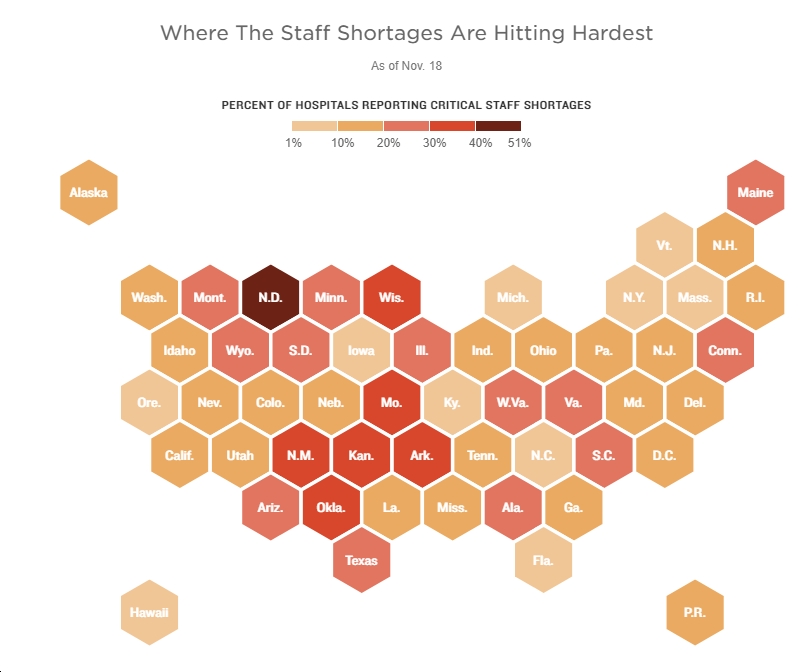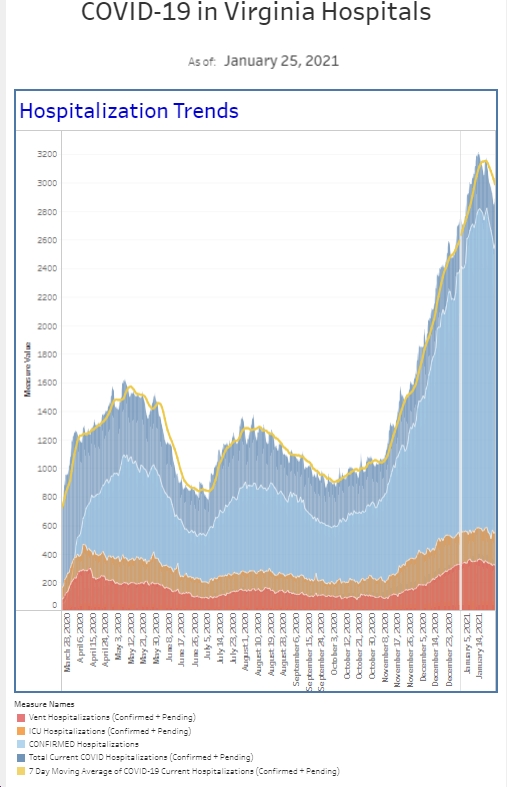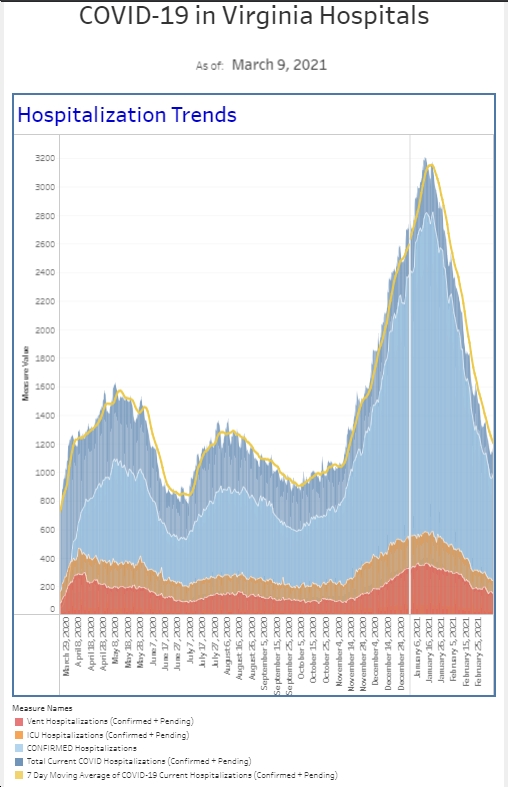Thanks as always to Dr. Mike Silverman, Chair of the Department of Emergency medicine at Virginia Hospital Center, for these helpful updates!
I meet with my chief nursing officer every month or so. Here’s how I know COVID is getting better. I did not have COVID listed as an agenda item when we met earlier this week. That’s probably the first time that’s happened in the last 18 months. As we dive into the data, I can’t really quantify it (you be the judge based on our data) but we are in a steady state—worse than summer but not as bad as our previous surges. The inpatient hospital census is down compared to last week. This marks a couple weeks in a row of decreasing numbers of patients that require hospitalization. Across the hospital system, we did see our highest percent positive rate in the last 6 weeks. We are seeing similar numbers in the emergency department for patients who require Covid isolation. This number started to tic up about 7 weeks ago and this past week was her second highest number of patients in this category. However, it was also among our lowest number of patients who required admission and our lowest admission rate along this patient population in the last 6 weeks.
We did have a bump in Covid cases this week compared to the previous week. You may recall that a week ago I reported a pretty significant decline in our percent positivity rate as well as the number of positive cases we had seen compared to the week before. Unfortunately, that trend did not continue. Our percent positivity rate among our symptomatic patients for this past week was the highest it has been in 6 weeks. We’re also had an increase in the number of symptomatic and asymptomatic patients compared to the previous week. Our overall percent positivity rate is 6.1%, above our 6-week running average of 5.6%. There are still hospitals and regions around the state that have large numbers of hospitalized COVID patients and some hospitals are still postponing elective surgeries to have bed capacity for the COVID patients.
There’s a lot of vaccination news. Pfizer has officially asked the US government to allow the COVID vaccine to be given to children ages 5-11. I know many people are anxiously awaiting the authorization of the vaccine for this age group. Pfizer announced this via Tweet on Thursday. It is anticipated that the FDA’s independent expert panel will debate the data behind this application when they meet on October 26.
J and J submitted a request to the FDA seeking approval for a booster for those 18 and older who received the first dose. J&J submitted data with a range of second doses from 2 to 6 months (effectiveness improves at 6 months) but did not request a specific plan but rather appears to be leaving it to the FDA to make a decision. The FDA has their outside panel of experts meeting next week to review J&J and Moderna booster requests. It’s possible boosters could go through the full FDA and CDC process and approve boosters by the end of the month.
The US Department of Health and Human Services (HHS) released a report this week stating that Covid vaccination “may have helped prevent hundreds of thousands of new COVID-19 infections and tens of thousands of deaths among seniors.” It is estimated that vaccinations were “linked to a reduction of approximately 265,000 COVID-19 infections, 107,000 hospitalizations, and 39,000 deaths among Medicare beneficiaries between January and May 2021,” They compared the time prior to the vaccine to the first 5 months of 2021 when the vaccine became available, the study found an 11 to 12% decrease in weekly COVID-19 hospitalizations and deaths among Medicare beneficiary for every 10% increase in County vaccination rates. We know the vaccine saves lives, and it is fantastic to see it quantified. Getting eligible people vaccinated is still our best way to return to a normal, pre-pandemic existence.
There was a study in JAMA this week comparing the rate of post-vaccination myocarditis to post COVID myocarditis among a Kaiser patient population. Post COVID myocarditis occurred 25/100,000 cases whereas post vaccine myocarditis occurred 0.8/million people after the first dose and 5.8/million after the second dose. All of these patients recovered. Myocarditis is scary but you’re much more likely to get it from COVID than from the vaccine.
In a study out of the New England Journal of Medicine this week, researchers looked to evaluate whether Pfizer vaccine effectiveness decreased over time in Qatar. Vaccine effectiveness against both symptomatic infection and asymptomatic of infection peaks about a month after the second dose of the vaccine. However, there is much more decline after the fourth month with a pretty significant drop in effectiveness in months 5 through 7. The good news is that the vaccine remains very effective at least through 6 months against severe, critical, or fatal cases of Covid. This is not necessarily new news, and the decision to give or received a booster, may come down to a philosophical discussion if you are trying to prevent all new cases or just prevent hospitalizations and death. The European Medicine Agency (EMA) approved giving a third booster shot of Pfizer 6 months after their second dose, to all people over the age of 18 this past Monday. Israel has already authorized a booster shot to its entire population.
This week is National Physician Assistant’s Week. Our PA’s are an integral part of our healthcare team, do a great job of providing care to our patients, and make a tremendously positive impact on our ER.
I got my flu shot this morning (see picture). Our charge nurse Maddy was giving them out to staff this morning. We’ve been required to get flu shots for as long as I can remember and while it’s never hard to get a flu shot at the hospital, it sure is easier when they are given in the department. Being a true ER nurse with an amazing ability to multitask, In the 2 minutes it took for her to enter my info into the hospital system and give me my shot, she also answered several phone calls, gave instructions to the triage nurse, and talked to 2 other nurses. Next week is Emergency Nurses Week and this group definitely deserves to be celebrated.
Science matters. Get vaccinated. Wear a mask. We’re not quite there.
Mike

















